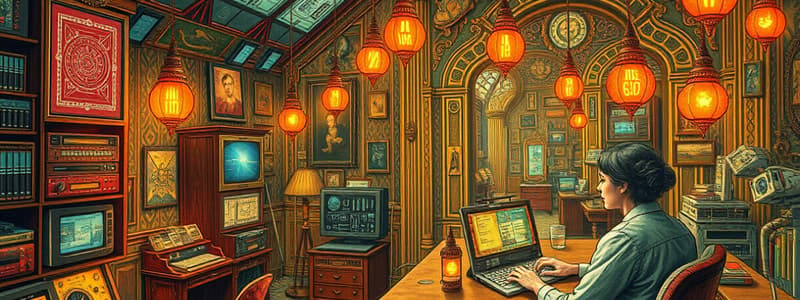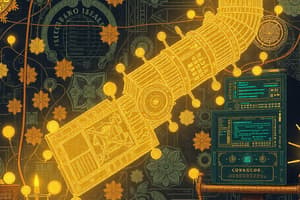Podcast
Questions and Answers
What is a computer?
What is a computer?
An electronic device that can accept data, manipulate it, and produce information from the processing.
Who invented the mechanical calculator called the Pascaline?
Who invented the mechanical calculator called the Pascaline?
Blaise Pascal
What did Gottfried von Leibniz extend the Pascaline to do?
What did Gottfried von Leibniz extend the Pascaline to do?
Multiplications, divisions, and square roots
Who is sometimes called the 'father of computing'?
Who is sometimes called the 'father of computing'?
Which generation of computers is referred to as Mechanical Calculators?
Which generation of computers is referred to as Mechanical Calculators?
What type of early computers were the vacuum tube computers?
What type of early computers were the vacuum tube computers?
What architecture did Claude Shannon propose for electronic circuits?
What architecture did Claude Shannon propose for electronic circuits?
What is the significance of the ENIAC?
What is the significance of the ENIAC?
What did the Cray-1 achieve?
What did the Cray-1 achieve?
What is a key feature of Generation 5 computers?
What is a key feature of Generation 5 computers?
Match the following computer parts with their type:
Match the following computer parts with their type:
Flashcards are hidden until you start studying
Study Notes
Introduction to Computers
- A computer is an electronic device that processes data through software stored in its memory, performing input, manipulation, and output tasks.
- The term encompasses a variety of interconnected devices functioning together as a system.
Historical Development of Computers
- Abacus: Used in Europe before the 1500s for basic calculations, enhancing the operator's memory rather than possessing inherent computation capabilities.
- Pascaline: Invented by Blaise Pascal in 1642, it was a mechanical calculator for addition and subtraction.
- Leibniz's Enhancements: In 1671, Gottfried von Leibniz modified Pascal’s design enabling multiplication and division.
Pioneers of the Computer
- Charles Babbage: Known as the "father of computing," he developed the Difference Engine in 1822 to automate polynomial function calculations and later designed the Analytical Engine, which was constructed posthumously.
Generations of Computers
- Generation 0: Mechanical Calculators.
- Generation 1: Vacuum Tube Computers (1946-1959).
- Generation 2: Transistor Computers (1957-1964).
- Generation 3: Integrated Circuits (1965-1970).
- Generation 4: Microprocessors (1970-1990).
- Generation 5: Emerging technologies focused on artificial intelligence (1990-present).
Important Computers in History
- ENIAC: Launched in 1946, recognized as the first all-electronic general-purpose digital computer.
Computing Concepts
- Binary and Boolean Logic: Claude Shannon advocated using binary arithmetic in electronic circuits, fundamental for modern computing.
- Von-Neumann Architecture: Comprised of three main components: CPU, Memory, and I/O System.
Evolution of Technology
- Cray-1: Designed by Seymour Cray, achieving 160 million instructions per second and featuring 8 MB of memory, a significant advancement in computing speed.
Advancements in Integration Technology
- Integrated Circuit (IC) Classifications:
- SSI: Small Scale Integration (10-100 transistors).
- MSI: Medium Scale Integration (100-1,000 transistors).
- LSI: Large Scale Integration (1,000-10,000 transistors).
- VLSI: Very Large Scale Integration (>10,000 transistors).
Current and Future Directions
- Generation 5 Computers: Focused on advancements in artificial intelligence, including voice recognition, quantum computing, bio computing, nano technology, and natural language processing.
Computer System Components
- Input Devices: Keyboard.
- Output Devices: Monitor, speakers, and printers.
- System Unit: Houses the processor and memory.
- Storage Devices: Examples include CD-RW and floppy disks.
Studying That Suits You
Use AI to generate personalized quizzes and flashcards to suit your learning preferences.




